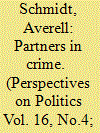|
|
|
Sort Order |
|
|
|
Items / Page
|
|
|
|
|
|
|
| Srl | Item |
| 1 |
ID:
164463


|
|
|
|
|
| Summary/Abstract |
Following the attacks of 9/11, the United States adopted a policy of torturing suspected terrorists and reinterpreted its legal obligations so that it could argue that this policy was lawful. This article investigates the impact of these actions by the United States on the global norm against torture. After conceptualizing how the United States contested the norm against torture, the article explores how US actions impacted the norm across four dimensions of robustness: concordance with the norm, third-party reactions to norm violations, compliance, and implementation. This analysis reveals a heterogeneous impact of US contestation: while US policies did not impact global human rights trends, it did shape the behavior of states that aided and abetted US torture policies, especially those lacking strong domestic legal structures. The article sheds light on the circumstances under which powerful states can shape the robustness of global norms.
|
|
|
|
|
|
|
|
|
|
|
|
|
|
|
|
| 2 |
ID:
162662


|
|
|
|
|
| Summary/Abstract |
In the years following the attacks of 9/11, the CIA adopted a program involving the capture, extraordinary rendition, secret detention, and harsh interrogation of suspected terrorists in the war on terror. As the details of this program have become public, a heated debate has ensued, focusing narrowly on whether or not this program “worked” by disrupting terror plots and saving American lives. By embracing such a narrow view of the program’s efficacy, this debate has failed to take into account the broader consequences of the CIA program. We move beyond current debates by evaluating the impact of the CIA program on the human rights practices of other states. We show that collaboration in the CIA program is associated with a worsening in the human rights practices of authoritarian countries. This finding illustrates how states learn from and influence one another through covert security cooperation and the importance of democratic institutions in mitigating the adverse consequences of the CIA program. This finding also underscores why a broad perspective is critical when assessing the consequences of counterterrorism policies.
|
|
|
|
|
|
|
|
|
|
|
|
|
|
|
|
| 3 |
ID:
147112


|
|
|
|
|
| Summary/Abstract |
It has been more than seven years since U.S. President Barack Obama [1] issued Executive Order 13491 [2], banning the U.S. government’s use of torture. Obama’s directive was a powerful rebuke to the Bush administration, which had, in the years after the 9/11 attacks, authorized the CIA and the U.S. military to use “enhanced interrogation tech¬niques” in questioning suspected terrorists. Some detainees were shackled in painful positions, locked in boxes the size of coffins, kept awake for over 100 hours at a time, and forced to inhale water in a process known as water¬boarding. Interrogators sometimes went far beyond what Washington had authorized, sodomizing detainees with blunt objects, threatening to sexually abuse their family members, and, on at least one occasion, freezing a suspect to death by chaining him to an ice-cold floor overnight.
|
|
|
|
|
|
|
|
|
|
|
|
|
|
|
|
|
|
|
|
|